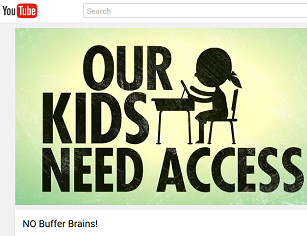SHLB: BDS Revamp Isn't Good for Students
The smarter way to stay on top of the multichannel video marketplace. Sign up below.
You are now subscribed
Your newsletter sign-up was successful

The Schools, Health & Libraries Broadband Coalition (SHLB), which lobbies for broadband deployment to anchor institutions in local comunities, has launched a campaign trying to get the FCC to reverse course on its new approach to business data services (BDS), saying with that approach "our kids will suffer from buffer brains rather than developing into the next generation of entrepreneurs and leaders."
FCC chairman Tom Wheeler was initially going to impose rate regs on both the Ethernet BDS service used by new competitive entrants like cable ISPs and the traditional TDM (time-division multiplexing)-based service provided by the incumbent telcos, but he subsequently switched to a case-by-case, market-by-market, complaint-driven appoach to Ethernet service price regs, saying that a balance between targeted regulation for legacy services, where evidence of market power is strongest, and lighter-touch regulation of packet-based services (cable ISPs, for example), where there has been new entry and competition may be emerging.".
SHLB doesn't see it that way. It wants the FCC to regulate both TDM and Ethernet below 50 Mbps in an "equivalent manner," saying not to do so excludes schools and libraries from the BDS revamp. It points out that 71% of E-rate funds (broadband subsidies for schools and libraries) go to Ethernet service.
SHLB wants the FCC to apply rate cuts across the board, not just to TDM, and rather than the 11% over three years price cut for TDM the FCC has proposed, they want 17%-20% cuts for both TDM and Ethernet.
It would prefer that the price regs apply to higher speeds than 50 Mbps, anything up to 1 gig, but say they are trying to be realistic given the FCC proposal not to regulate the higher speeds, where the FCC has suggested there is more competition for BDS than at the lower speeds.
The campaign, which launched with a YouTube video and press conference Thursday (Nov. 3), is called #NoBufferBrains and it wants the FCC to make "emergency improvements" to the proposal. "Emergency" because FCC Chairman Tom Wheeler has scheduled a vote on the latest BDS proposal for the Nov. 17 public meeting after originally circulating it for a vote outside a public meeting.
"Originally, the FCC promised a technology-neutral approach that would have benefited anchor institutions by lowering their costs, providing more choices, and encouraging deployment and availability of high-speed internet connections," said the group. "But at the last minute, the proposal was weakened to focus only on older technologies, or TDM lines, and pass on providing price relief for Ethernet customers."
The smarter way to stay on top of the multichannel video marketplace. Sign up below.
Cable Ethernet providers don't like either of the FCC's approaches, saying it did not make sense to regulate new entrants after encouraging them to enter the market.
Representatives of the group said they had met with FCC Commissioner Jessica Rosenworcel Thursday (Nov. 3) about the issue. She has made faster and cheaper high-speed broadband to schools and libraries a centerpiece issue.
They have also met with FCC Chairman Tom Wheeler, Commissioner Mignon Clyburn and a staffer for commissioner Michael O'Reilly, and are trying to set up a meeting with Commissioner Ajit Pai.
Contributing editor John Eggerton has been an editor and/or writer on media regulation, legislation and policy for over four decades, including covering the FCC, FTC, Congress, the major media trade associations, and the federal courts. In addition to Multichannel News and Broadcasting + Cable, his work has appeared in Radio World, TV Technology, TV Fax, This Week in Consumer Electronics, Variety and the Encyclopedia Britannica.

